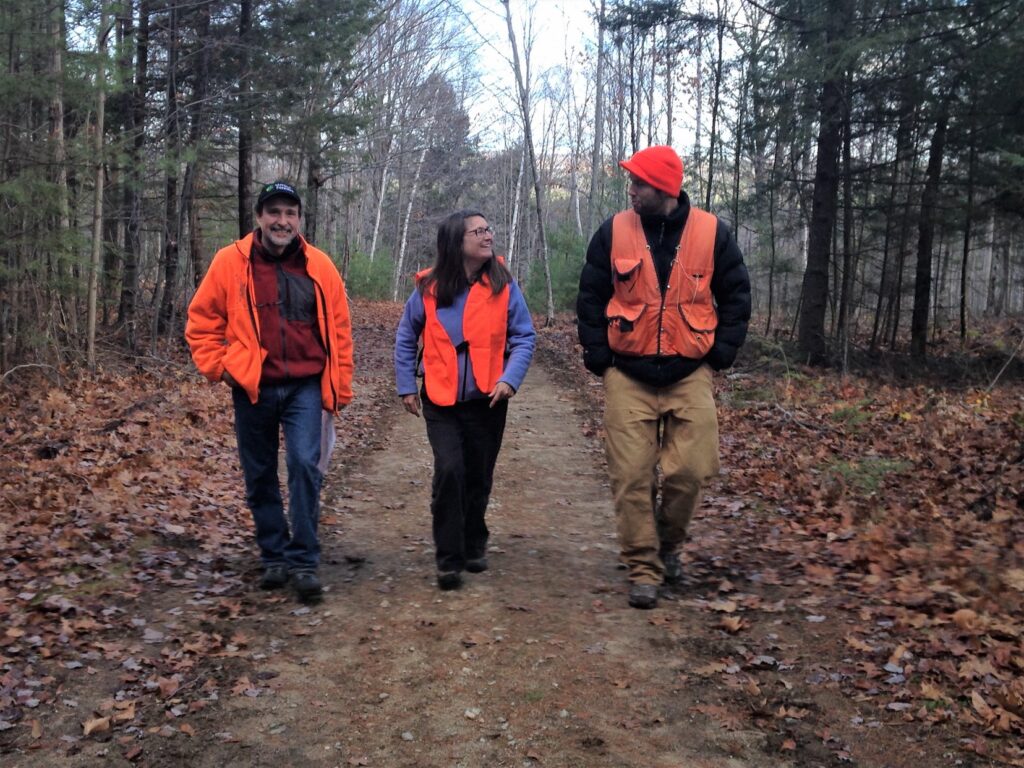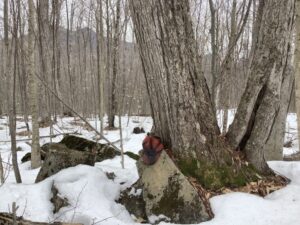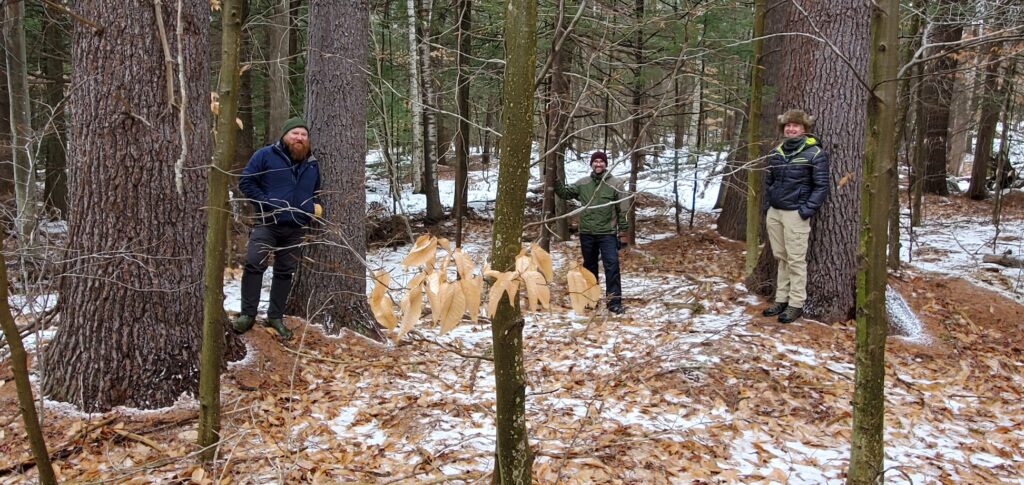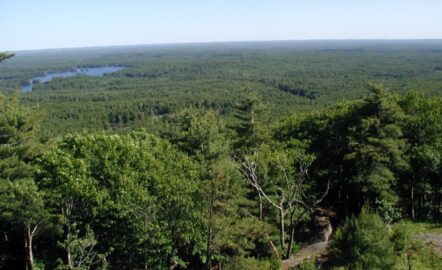NH Forester licensing program on chopping block

The second most forested state, NH may end its forester licensing program
by Hadley Barndollar, New Hampshire Bulletin
March 2, 2023
When David Falkenham heard the state’s forester license is on the chopping block as part of budget talks in Concord, two words came to mind: “complete disaster.”
What followed were thoughts about the timber harvest checks, ranging from $5,000 to $100,000, that he personally delivers to landowners as a forester licensed by the state of New Hampshire. He thought of the particular ways forest landscapes have to be styled to attract songbirds and other kinds of wildlife. How he crafts forest management plans and dictates the actions of loggers on properties he’s been hired to care for.
All of the things he takes pride in, and knows not just anyone can do.
“As one of the most forested states in the nation, why would you entrust the management of that resource to unlicensed professionals or professionals not held to a very high standard?” Falkenham asked.
A Lancaster resident who works for New England Forestry Consultants, Falkenham isn’t alone in wondering why Gov. Chris Sununu is trying to do away with the state’s forester license. For 30 or so years, the Board of Foresters, today housed in the state’s Office of Professional Licensure and Certification, has evaluated all individuals who want to be a steward of New Hampshire’s woodlands through gaining a forester license.
Licensing reforms proposed by Sununu this budget session include axing 34 state licenses and eight boards that oversee them, including the Board of Foresters, as a means of streamlining processes, removing workforce barriers, and getting rid of redundancies. Joining foresters on the list of state licenses proposed to be repealed are medical technicians, licensed nursing assistants, radiation therapists, cosmetology booths in already licensed facilities, and wetland and soil scientists.
This isn’t the first time state officials have looked at eliminating or simplifying licensing. There have been a handful of times in recent decades when legislative committees formed to examine potential changes, including one in 2019 that recommended against scrapping the state’s LNA license requirement.
In the case of LNAs, the state currently has a duplicative process, repeating what the federal government already requires, said Lindsey Courtney, executive director of the Office of Professional Licensure and Certification. When asked about foresters and scientists, Courtney said, “I think the state really ended up balancing the potential risk and harm to the public of not having licensing with the benefits of licensure.”
“The boards that have been proposed for elimination are boards that have not received many complaints or taken many disciplinary actions or misconduct findings,” she added. “That raises the question of whether the board is necessary.”

Karen Bennett, a retired forester who helped usher in the state’s licensure program in the late 1980s and early ‘90s, feels the license is absolutely necessary as a means of “consumer safety.” Forests are complex systems, she said, serving as “wildlife habitats, air cleaners, and carbon storers,” to name a few major functions.
“Before there was forester licensing, anyone could say they were a forester,” Bennett said. “What (repealing this) will mean is anyone can say, ‘I’m qualified.’ This will muddy the waters a lot and make it harder for landowners to make informed decisions.”
Foresters serve as ‘fiduciaries to landowners’
New Hampshire is the second most forested state in the country, behind Maine. As of 2020, the state had just over 4.7 million acres of forest, making up approximately 82 percent of its total land base. That’s according to the state’s Forest Action Plan published in 2020, which also says the majority of forests are privately owned. More than 128,000 landowners represent over 70 percent of the state’s forested acreage.
With the high percentage of privately owned forests, that’s where foresters come in. Private landowners can hire foresters to oversee their land, make budgets and management plans, perform timber appraisals, and supervise work done on the property. Foresters help woodlot owners achieve their desired objectives, like recreation, wildlife habitats, scenic beauty, or income opportunities.
During fiscal year 2019, the state’s Forest Stewardship Program, a partnership between UNH Cooperative Extension and the Division of Forests and Lands, referred 278 landowners owning more than 30,000 acres to licensed foresters who wrote stewardship plans for 4,800-plus acres.
The state’s Forest Action Plan says New Hampshire “has one of the highest (if not the highest) ratios of foresters offering services to the public per acre of forestland in the nation.” There are approximately 250 licensed foresters in the state, according to the Office of Professional Licensure and Certification.

Steve Roberge, state forestry specialist for UNH Extension and chair of the Board of Foresters, said people in his profession serve as fiduciaries to landowners.
“You are responsible for that landowner’s asset,” said Roberge, speaking personally and not on behalf of the Board of Foresters. “The licensing allows the public to know the person they are working with meets the qualifications to be a forester and is held to that ethical and fiduciary responsibility.”
Ben Vihstadt, spokesman for Sununu’s office, said forestry is a “critical and valued industry in New Hampshire.” The governor wants to cut away red tape and break down barriers to employment, he said, and the low number of complaints received each year by the Board of Foresters is “evidence of the responsible and self-regulating nature of our foresters.”
He continued, “Given the small number of licensees and the availability of private, national-level certifications, mandating licensure by a separate state board is not necessary to ensure the public’s safety.”
To Roberge, the lack of complaints is a testament to the licensing program itself.
‘A level of education, experience, and that they’re accountable’
UNH Cooperative Extension provides a comprehensive directory of licensed foresters, as well as guidance for landowners on how to go about selecting the right person for the job.
Falkenham expects most people would only want to hire a forester who is licensed. The Society of American Foresters offers a forester certification, but the foresters interviewed for this story said there are different qualifications for it, and there’s something to be said for a local license with recourse.
“It means there’s a level of education, experience, and that they’re accountable,” Bennett said. “They’re held to a certain standard. And if they don’t meet that standard, a landowner can file a complaint.”
Hundreds of changes to state statutes would be associated with the license dissolutions, Sununu has said. There’s currently a licensed forester state law in place that makes it unlawful for anyone to offer forestry services in New Hamps

hire “unless such person has been duly licensed.” Roberge isn’t sure what will happen to the law if the license is repealed.
“I’m a licensed forester and I’m proud to be a licensed forester here in New Hampshire,” he said. “It is an acknowledgement of the profession that we’re in.”
New Hampshire Bulletin senior reporter Annmarie Timmins contributed to this story.
New Hampshire Bulletin is part of States Newsroom, a network of news bureaus supported by grants and a coalition of donors as a 501c(3) public charity. New Hampshire Bulletin maintains editorial independence. Contact Editor Dana Wormald for questions: info@newhampshirebulletin.com. Follow New Hampshire Bulletin on Facebook and Twitter.
New Hampshire Bulletin stories may be republished online or in print under Creative Commons license CC BY-NC-ND 4.0. We ask that you edit only for style or to shorten, provide proper attribution and link to our web site. Please see our republishing guidelines for use of photos and graphics.